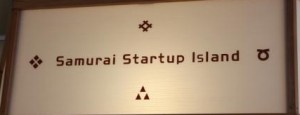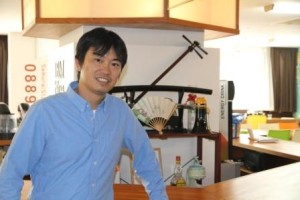I first heard the name “Ken Samurai” during a short visit to Israel. Some mutual friends connected me to his staff, which in turn invited me for a visit at the “Samurai house” in Tel Aviv, guided by Ani Terada – a very young founder and CEO of one of their portfolio companies – Aniwo. Ani and his Aniwo team are one of 15 startups using Samurai Tel-Aviv’s coworking space, and one of over 100 startups in Samurai Incubate’s portfolio.
It serves both as Samurai Incubate’s Israel office, and as a co-working space for young start-ups looking for a space to work and engage with other like-minded entrepreneurs. It’s located smack in the bustling middle of Tel-Aviv, just on top of Tel-Aviv’s endless nightlife, a spit away from dozens of restaurants, Cafes, bars, a colorful market, a few minutes walk away from the beach, and not less important – smack in the middle of what became a hotspot area for Israeli startups.
Ani was great in showing me around and introducing me to whoever was around the place. Everybody was super friendly, and it didn’t take much to make a bunch of new friends – all working on a new exciting technology or service. The atmosphere around the office is very homely, and at the same time ignites a feeling of a fighting spirit – the place is filled with little symbols and reminders of the Bushido spirit – the way of the warrior.
I also learned more about what Samurai Incubate is all about, and got to hear a bit about “Ken Samurai” – the somewhat mythical figure that got all of that going. Unfortunately he was not in Israel at the time.
Since that visit, I ran into a few more people related to Ken or Samurai, and kept hearing a lot of positive things about Ken and his strong impactful spirit.
This is why when I started working on TrailPassion.com, his name was one of the first that came to my mind as someone whose thoughts on Passion I would love to probe.
For one, I couldn’t imagine how he would have done what he was doing without some significant underlying drive. With absolutely no Hebrew or familiarity with Israeli culture, with limited English, he took himself and just came to Israel to start a Samurai office – about a year earlier – he just decided it’s the thing to do, and went for it. The other things is that visiting the office, and hearing about his personality impact, I realized it’s someone who just transmits a strong Passion around him.
One piece of feedback that Ken keeps getting from Israelis who see him give a talk – “you are Passion-native”.
This time, I had the pleasure to visit Ken in his Tokyo office and coworking space, known also as “Startup Island”.
Passion?
When I started the conversation challenging Ken for a definition of “Passion”, he started with challenging me right back. “It’s on our website, on the company mission description”, and followed quite quickly with strongly announcing that “Passion is very important, but only passion is not – execution is key”.
So which one is it, I was thinking. I felt I was handed a bit of a confusing riddle, and figured that’s as far as I’ll go with the request for a definition.
The Mission page of Samurai Incubate indeed has a strong statement: “Go Action! Go Change! can change the world”. The word Passion appears following that, with the statement that “Our company name is derived from the passion to convey our mission”. If nothing else, this seems to be in line with Ken’s thoughts – passion is geared towards action.
I was about to move on to a different topic, when Ken followed up with his actual definition for passion. The translation to English gets a bit tricky, but my best attempt is “Hold up a [big objective/ mission/ motive] and take action”. (大きな志を掲げて行動をする)
When explaining his own passion, Ken went deeper and farther than I had any expectations for, and took me by surprise. I expected to hear something about startups, or investments. Maybe something about connecting Japan and Israel (as per Samurai Incubate’s strong activity with Israeli startup investments, and connecting Israeli startups to Japan).
Instead, the Passion that Ken holds strongly to is “receive the Nobel peace prize”. And once there, there is already a follow-up step of creating a “Samurai Prize”.
Why?
Ken seems to possess an unmatched ability for self reflection.
“I was always looking to stand out”. Ken likes attention. Positive, appreciative attention, and a lot of it. The meaning of being alive, is to feel your “raison d’aite” your reason of existence, and I want to feel it to the maximum possible.
Ken wants to leave his mark on the ground, wants to do something that will get a lot of people to notice him – and not something bad, something positive. Ken wants to get to a point in which he will be recognized and appreciated for what he has done – wants to be told “things are great thanks to you” across the world, by hundreds of millions of people.
He just doesn’t want to end life feeling lonely.
Doing good for the world to the point of recognized with the Nobel peace prize seems to fit the bill.
So how is that connected to startups? To activity in Israel?
We can help drive peace through advanced technology. And with everything that is happening in the middle east, and specifically in Israel – there is a lot to contribute by taking action there.
Find your Passion
As Ken explained about his core “why”, he was always looking to get noticed, that need was always there. But it took some time before he could define for himself his target and passion towards getting a Nobel peace prize. And before he got into supporting startup growth in Israel.
Ken started his career as a medical equipment salesperson. He did it for 3 years, and was quite frustrated throughout. It was not about standing out, about being recognized by or exposed to millions of thankful people. It was the day to day reality of trying to sell equipment to self indulging doctors. He felt he was not on equal grounds when making proposals, feeling a lot of disrespect, seeing decisions made on for personal benefits, a lot of last-minute cancelled appointments, etc.
Another thing he didn’t feel comfortable with – it was difficult for him to feel ownership of the products he was selling. They were not something he developed or produced and felt connected to. He just had to go and sell whatever was coming down the line.
So as the internet boom hit Japan, he used it as an opportunity to jump over to a new industry. In 2000 he joined a new E-commerce startup as one of the founding members. This was something new and blooming, and even without specific experience in the industry, he felt great working in that environment. Things happening on equal footing, and he could go and introduce things he created himself. Things he was a part of.
During this time he also gained an important insight that is part of what eventually became the mission statement for Samurai Incubate, and integral part of his thinking and beliefs.
If you go ahead and try, the world moves. Or in other words, “if you Go Action!, you will get it”.
(Bad translation to English is mine. Originally: “Go Action!すれば、手にする”)
Ultimately, the company was acquired by Cyber Agent (a huge media company and digital ad agency) .
By that point in time, Ken got somewhat familiar with the world of startups, and what he realized was that there are a lot of great startups, with great ideas and strong engineering, but usually they are not very strong with sales.
With these insights and experience, he started Samurai 8 years ago. The business model at the time was very different, and he started with supporting startups with a sales-force outsourcing model. Once he started running, he realized more and more that the real needs of startups are getting funds (so that they can pay for a sales force), getting a workspace, along with some other core needs. Mostly, whatever those needs were, they needed the funds for them.
It took him about a year since establishing the company, and he started moving to a startup funding model. This was also the time at which his passion, his target of receiving a Nobel peace prize came together.
In Japan, investment, money, venture capital has a bad image and reputation. When he realized the need of the startups to get funds, and was considering the move to his new business model, he had some concerns about that. At the time he got some advice from a famous venture capital investor: Using money, and creating new entrepreneurs, is the best social contribution for the world. The number of employees will then increase, money will go to more households, and poverty will get eliminated – everybody will become happy.
This is when his thinking got bigger, moving from helping startups, to seeing that as a tool to helping the world, and aiming at the Nobel peace prize.
This view in turn, is also what brought him to think about moving to Israel. He opened the Tel Aviv office about a year ago, though he was thinking of doing it since about a year earlier.
The move to Israel (“startup nation”) was not a move motivated mainly by a need to find more startups, but rather by the need to be able to make a bigger impact where there was a need.
At this point, Ken moved for a few minutes from discussing his own path, to one of the things he immediately noticed when arriving in Israel. There is a big difference in his eyes between how Japanese entrepreneurs and Israeli entrepreneurs think. Israelis seem to have a much longer-term vision, both for where they want to take their startup, and also personally. While Japanese entrepreneurs will many times consider end-game success as making money with their company, their Israeli counterparts many times see that as a step, followed by a move to invest themselves in other startups. It helps a lot to strengthen the ecosystem.
Back to our story, in a very Ken Samurai “Go Action!” style, he took himself, and came over to start Samurai activity in Israel.
He just hired a manager for the activities in Tel-Aviv, but generally plans to stay around (he currently alternates months living in Japan and Israel) until he can get that Nobel Prize.
Before we moved to discussing again some of the philosophical points around Passion, we had a bit of a chat about the strong bonds that get easily made between Israelis and Japanese. Ken is very thankful for a lot of the great friendships he could make quickly coming to Israel with no prior knowledge, and the great support, as I am thankful for the great warmth and support I received in Japan over the years. Ken likens Israelis to Osaka people – very likeable, very warm, great humor, and easy to make friends with.
Do you need Passion
To wrap up, I like going back to checking in on the assumption that Passion is important, and trying to understand how it differs from some other related concepts.
With Ken’s strong Go Action! approach, I was not so sure what I should expect.
When thinking about new entrepreneurs, Ken strongly believes that Passion is key. There are a lot of great ideas and services out there, but without Passion, people will not have the persistence to go through and get to success.
Ken likens “Passion” to what they call in his company the “Samurai Spirit”, and he and his team strongly believe that the Samurai Spirit is key for business success.
When I asked Ken for an estimate of how much of the mix of things does Passion (or in this case, Samurai spirit) is taking – he easily came with the answer 80-90%. Most of other things will come together, but without passion, there is no action and no success.
With such high level of importance – can he really estimate a person’s “passion” when he meets her or him, I was wondering. Specially when he looks into investing in Israeli entrepreneurs, with a different language, different culture.
Ken is quite confident in this. You can learn a lot from talking to people and asking them about their past experience, choices and actions, successes and failures. In Samurai Incubate, they have developed a grading ladder across the eight Samurai codes of conduct. These are taken from Bushido, and Ken’s team translated them to a grading-system with which they can consider new potential entrepreneurs.
You can find those on Samurai’s Mission page. The codes of conduct are: Righteousness, Thanks, Courage, Honor, Humanity, Honesty, Loyalty and Challenge.
Passion, Vision, or a Dream?
Ken used the analogy of a car here: the energy (gasoline or electricity) and engine are Passion – they give the power to move. Vision is the steering wheel. Dream is the destination of the car.
—–
 If you want to learn more about Samurai Incubate, you can visit their website.
If you want to learn more about Samurai Incubate, you can visit their website.
You can find information about ongoing events in the Tel Aviv and Tokyo offices, about using their Samurai Startup Island space (startup hub), applying to become a Samurai (get seed money), look at potential collaborations and more.
You are also welcome to check out (and Like) their Facebook pages: Samurai Incubate, Samurai Startup Island, or Samurai House in Israel.


